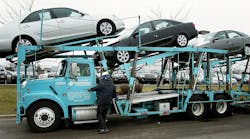Although the Federal Motor Carrier Safety Administration has barely begun exploring the feasibility of regulatory negotiation – or “reg neg” – to establish standards for entry-level driver training, it’s already clear that key parties that would be involved in such a negotiation are skeptical.
One of the fundamental controversies in rulemaking efforts to date has been FMCSA’s focus on the number of hours a new driver must spend in training. The American Trucking Assns. strongly objected to this approach, but it’s likely that some other groups will insist on a minimum number of hours behind the wheel. And if that’s the case, ATA doesn’t believe FMCSA will be able to justify the cost.
“ATA supports strong, performance-based entry-level driver training standards,” Dave Osiecki, ATA’s executive vice president and chief of national advocacy told Fleet Owner. “Truck drivers are professionals and they should be held to high standards of training and safety before being allowed behind the wheel.”
But FMCSA has been challenged to issue strong, cost-beneficial driver training rules due to lack of data and research on the safety impact of training standards, Osiecki said. “As a result, it is difficult to see how a negotiated rulemaking gets FMCSA past the cost-benefit hurdle, regardless of the agency’s good intentions.”
Another important group that would presumably be a party to any negotiated rulemaking is the Owner-Operator Independent Drivers Assn., which said it welcomed action on entry-level training standards.
“OOIDA and its membership are ready to work with the convener and the agency to ensure that all new commercial vehicle operators are trained to operate a vehicle safely and efficiently in real-world conditions,” an agency spokesperson told Fleet Owner. “Unfortunately this notice does not include a timeline. We encourage the agency to lay out a more specific plan and timeline to ensure the process to develop meaningful training requirements will stay on track.”
During the unresolved fight over whether to suspend the July 2013 changes to the hours-of-service (HOS) restart provisions, OOIDA had called on FMCSA to issue the long-overdue training rules instead of focusing on HOS or electronic logging devices.
FMCSA last tried reg neg in the context of maintenance responsibilities for intermodal chassis – an issue that pitted carriers, railroads, maritime companies, port operators and others against one another. The agency said in November 2002 that it would explore a negotiated rulemaking in November 2002, but it announced at the end of December 2013 that it had given up on the idea that the parties could reach a consensus that way.



